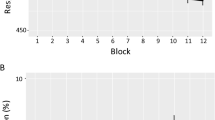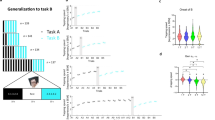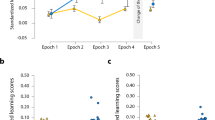Abstract.
Previous studies using simple, repeating patterns have suggested that the knowledge gained in early sequence learning is not effector-specific in that it transfers to muscle groups other than those used during training. The current experiments extended these findings to transfer after extensive practice with probabilistic sequences using a task on which people fail to gain declarative knowledge of the regularity. Specifically, an alternating serial reaction time (ASRT) task was used in which predictable and unpredictable trials alternated. Participants responded for the first five sessions using their right hand, then switched to the left hand for the sixth session. Stimuli were spatial in the first experiment and nonspatial in the second. Significant near-perfect transfer of pattern knowledge was seen in both experiments, suggesting that muscle-specific information for either the fingers or the eyes cannot explain the observed learning.
Similar content being viewed by others
Author information
Authors and Affiliations
Additional information
Electronic Publication
Rights and permissions
About this article
Cite this article
Japikse, K.C., Negash, S., Howard, J.H. et al. Intermanual transfer of procedural learning after extended practice of probabilistic sequences. Exp Brain Res 148, 38–49 (2003). https://doi.org/10.1007/s00221-002-1264-9
Received:
Accepted:
Issue Date:
DOI: https://doi.org/10.1007/s00221-002-1264-9




